-
-
- Advancement of the Professions Committee
- Standards Committee
- Audit and Risk Committee
- Education Committee
- Disciplinary Committee
- Charter Case Committee
- Preliminary Investigation Committee and Disciplinary Committee Liaison Committee
- Registration Committee
- Preliminary Investigation Committee
- Paper classification: some definitions
-
-
-
-
- About extra-mural studies (EMS)
- EMS requirements
- Information for vet students
- Information for EMS providers
- Information for vet schools
- Temporary EMS requirements
- Practice by students - regulations
- Health and safety on EMS placements
- EMS contacts and further guidance
- Extra-mural studies fit for the future
-
-
- Code of Professional Conduct for Veterinary Surgeons
- Code of Professional Conduct for Veterinary Nurses
- Contact the Advice Team
- XL Bully dog ban
- 'Under care' - guidance
- Advice on Schedule 3
- Controlled Drugs Guidance – A to Z
- Dealing with Difficult Situations webinar recordings
- FAQs – Common medicines pitfalls
- FAQs – Routine veterinary practice and clinical veterinary research
- FAQs – Advertising of practice names
- GDPR – RCVS information and Q&As
-
- Accrediting veterinary degrees
- Accrediting veterinary nursing qualifications
- Reasonable adjustments for student vets
- Health and disability in veterinary medicine study and practice
- The role of the veterinary schools and the RCVS
- Reasonable adjustments and the Equality Act 2010
- Reasonable adjustments and Day One Competences
- Examples of reasonable adjustments for vet students
- Annex
- Reasonable adjustments for student vets - summary
- Reasonable adjustments for student veterinary nurses
- Health and disability in veterinary nurse education and training
- Reasonable adjustments for students and the UK disability discrimination legislation
- Educational assessment of veterinary nurses
- Roles of key stakeholders in the application of reasonable adjustments
- Examples of reasonable adjustments for vet nurse students
- Embracing reasonable adjustments for student vet nurses - summary
- External review of the RCVS by ENQA
- Requirements for remote and online student assessments
RCVS Day: New RCVS President stresses importance of role models to inspire young vets and improve diversity
17 July 2019
During his inaugural speech as RCVS President for 2019-20, Dr Niall Connell quoted US children’s rights activist Marian Wright Edelman on the importance of role models for diversity saying, “It’s hard to be what you can’t see.”
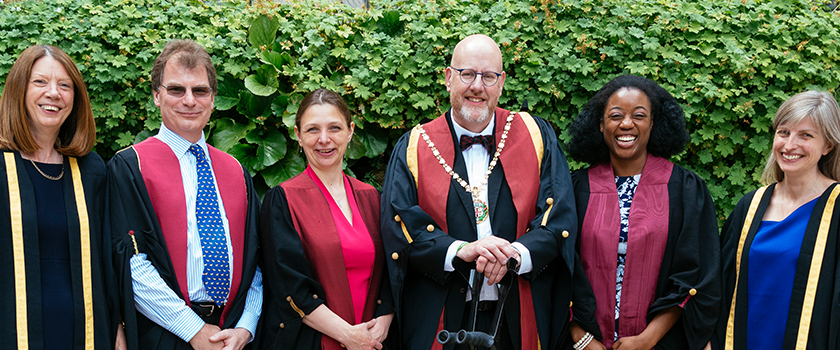 Niall was invested as RCVS President at this year’s Royal College Day – the College’s Annual General Meeting and Awards Ceremony – which took place at the Royal Institute of British Architects (RIBA) on Friday 12 July. He succeeds Amanda Boag who has now become Senior Vice-President of the RCVS.
Niall was invested as RCVS President at this year’s Royal College Day – the College’s Annual General Meeting and Awards Ceremony – which took place at the Royal Institute of British Architects (RIBA) on Friday 12 July. He succeeds Amanda Boag who has now become Senior Vice-President of the RCVS.
A graduate of Glasgow Vet School in 1982, Niall has been an elected member of Council since 2013 and had a career in small animal practice including managing the PDSA Petaid Hospital in East Glasgow for 15 years. In 2003, he was diagnosed with multiple sclerosis and, in 2009, took ill-health retirement. As well as being a member of RCVS Council, since his retirement he also works as a Clinical & Professional Skills Instructor at Glasgow Vet School.
During his speech Niall mentioned his own role model – Alf Wight (better known as James Herriot), who, like him, came from a working-class background in Glasgow.
“He grew up in North Glasgow and his dad was a plater in a Glasgow shipyard. I was born in the East End of Glasgow and my grandfather and great-uncle were platers at John Brown’s on the Clyde.
“We can all benefit from having role models throughout our lives, but children in particular need them most. We should be encouraging diverse role models into schools, to improve awareness of our professions and help inspire youngsters from all backgrounds.
“We also need to improve, support, and protect diversity in the workplace and not be afraid to call out things that are not right or safe for any individual,” he said.
Niall said that, as President, he would continue to Chair the new RCVS Diversity & Inclusion Group in order to try and break down barriers in regards to selection, recruitment and retention to encourage more ethnic and socio-economic background diversity within the veterinary professions.
Niall also outlined his other priorities during his presidential year. These include: continuing the work of the Graduate Outcomes project to better understand how young vets can be supported in the early part of their career; continuing to work with BVA and Defra on Brexit preparations; continuing to look at the role of RVNs and other paraprofessionals; and carrying out the College’s pending review on ‘under care’ and 24/7 cover.
AGM and changes to RCVS and VN Councils
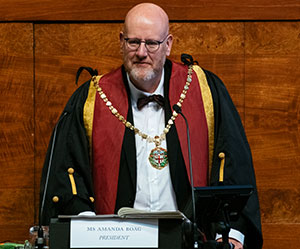 Royal College Day 2019 started with the 176th Annual General Meeting of the membership of the College, in which new appointed and elected members of RCVS and VN Councils were welcomed and retiring members were thanked. At the beginning of the AGM Amanda Boag highlighted that it was a special year for the RCVS as it marked 175 years since the first Royal Charter was granted and the College came into existence.
Royal College Day 2019 started with the 176th Annual General Meeting of the membership of the College, in which new appointed and elected members of RCVS and VN Councils were welcomed and retiring members were thanked. At the beginning of the AGM Amanda Boag highlighted that it was a special year for the RCVS as it marked 175 years since the first Royal Charter was granted and the College came into existence.
The RCVS Annual Report and Statement of Accounts were also presented for discussion and adoption, and questions on its content invited. At this point, it was reported that the College had, on the previous day, received a number of queries by email from those who had concerns about telemedicine and related issues, as well as the upcoming RCVS review of the concept of ‘under care’ and provision of 24/7 emergency cover. Summaries of the questions submitted by 5pm that day were read out, along with short responses to them. The full questions and detailed answers will be included in the AGM minutes and published online in due course.
Some questions were also asked from the floor, some of which related to telemedicine and the review which were similar to the email questions, and another which involved private matters.
The AGM was followed by a short meeting of RCVS Council in which the new Officer Team for 2019-20 was confirmed, comprising Dr Niall Connell as President, Amanda Boag as Senior Vice-President, Dr Mandisa Greene as Junior Vice-President and Dr Christopher (Kit) Sturgess as Treasurer.
RCVS Council also accepted a petition from Dr Shams Mir and Dr Suzanna Hudson-Cooke of the British Veterinary Union titled ‘We urge the RCVS not to authorise prescription of POM-V remotely without physical examination of the patient / herd’, which, at that time, had been signed by 1,219 individuals.
Awards and honours
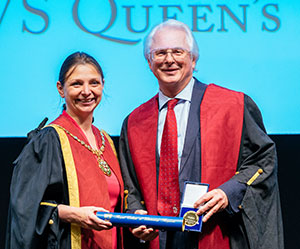 Following the AGM was the awards ceremony, which, in addition to the College’s usual suite of awards, saw the bestowal of a number of RCVS Knowledge awards and the inaugural Sarah Brown Mental Health Research Grant, which was presented to a team from Scotland’s Rural College.
Following the AGM was the awards ceremony, which, in addition to the College’s usual suite of awards, saw the bestowal of a number of RCVS Knowledge awards and the inaugural Sarah Brown Mental Health Research Grant, which was presented to a team from Scotland’s Rural College.
The awards bestowed were as follows:
- RCVS Queen’s Medal: Professor the Lord Trees
- RCVS Veterinary Nursing Golden Jubilee Award: Jane Devaney
- RCVS International Award: Dr Abdul-Jalil Mohammadzai and Dr Sam Thevasagayam
- RCVS Impact Award: Professor Sarah Freeman and Professor Paul McGreevy
- RCVS Inspiration Award: Dr Laura Muir and Louise Northway
Chief Executive’s Address
The key theme of the address from RCVS CEO Lizzie Lockett was that the College was always striving to improve and, through its portfolio of projects and initiatives, working to make things better for the professions.
“We are not perfect. But we are always striving to be better. And, meanwhile, I would rather not wait until we are perfect before we start reaching out to try to improve things for the professions. Things like mental health and wellbeing, everyday leadership skills, and the ability to deal with innovation, change and uncertainty.
“And just as we are aiming to help turn a blame culture into a learning culture, by encouraging self-reflection and discussion around mistakes, it’s important to reflect on our own areas for improvement,” she said.
Lizzie then highlighted some of the College’s key achievements during Amanda’s presidential year including: the RCVS gaining accreditation from the European Association for Quality Assurance in Higher Education; the launch of the Diversity & Inclusion Working Group; the launch of the Graduate Outcomes consultation; and, the RCVS and British Veterinary Association successfully lobbying the Migration Advisory Committee to recommend veterinary surgeons be added to the Shortage Occupation List, among other successes.
She added: “Finally, we are celebrating our 175th anniversary. That’s over 175 years since a group of veterinary surgeons petitioned the Royal Veterinary College because they felt that its training was not fit for purpose. It is perhaps fitting, though, that 175 years later, the RVC is celebrating being independently ranked the top vet school in the world and, whilst our own founding fathers would no doubt heartily approve, I am not sure we can entirely claim that as an RCVS success.”
Veterinary Nurses (VN) Council Chair address
The address from Veterinary Nurses Council Chair Racheal Marshall gave an overview of some of the achievements of VN Council and the VN Futures initiative over the last year – including the approval of two new qualifications in advanced veterinary nursing, that in the future could pave the way to a formal Advanced Veterinary Nurse status.
Racheal also praised the growing confidence of the veterinary nursing profession and the way it had been taking ownership of certain aspects of practice such as the Practice Standards Scheme, quality improvement and workplace mental health and wellbeing.
However, she also relayed the fact that it was clear, from her discussions with both veterinary nurses and veterinary surgeons, that there was a desire to bolster the role of the veterinary nurse.
“Work is currently underway to shape proposals for future legislative reform, part of which involves looking at how the role of the Registered Veterinary Nurse can be expanded. I would urge everyone within the professions to support expansion of the VN role and ensure we have regulation fit for the future.
“We are all part of the vet-led team and are working for the same goal to ensure the health and welfare of our patients. It is time for change, as a profession we are ready, and we now ask for your support,” she said.
President’s address
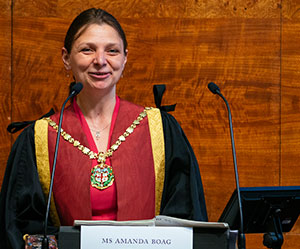 In her last speaking engagement as RCVS President, Amanda Boag said that meeting so many vets and vet nurses across the country had been the highlight of her presidential year and had led her to appreciate the leadership qualities of those in the veterinary professions. With this, Amanda officially launched the Inspiring Veterinary Leaders campaign and accompanying video, which showcased the leadership skills of 12 veterinary professionals all at different stages of their careers. These leadership stories are available to watch and read on the dedicated Inspiring Veterinary Leaders webpage.
In her last speaking engagement as RCVS President, Amanda Boag said that meeting so many vets and vet nurses across the country had been the highlight of her presidential year and had led her to appreciate the leadership qualities of those in the veterinary professions. With this, Amanda officially launched the Inspiring Veterinary Leaders campaign and accompanying video, which showcased the leadership skills of 12 veterinary professionals all at different stages of their careers. These leadership stories are available to watch and read on the dedicated Inspiring Veterinary Leaders webpage.
Amanda also outlined how she was glad that the need to improve diversity in the veterinary profession, a key theme of her presidential year, was now being discussed more openly, as were both overt and structural discrimination (issues also highlighted in recent reports by the BVA).
Other issues Amanda highlighted in her speech included the fact that the College would continue to argue that a ‘no deal’ Brexit would have significant implications for animal welfare and public health; taking the lead in the regulation of the wider vet led team and the importance of delegating, trusting and empowering those within it; and, the challenges posed by new technologies and how best to regulate these for the benefit of society and animal welfare.
She said: “There is still much to learn and do to ensure we are providing the best care for animals in our complex, global, 21st century environment. As my presidency comes to an end I am excited about the impact we can all have by embracing this.”
Before handing over the reins to Niall Connell, Amanda thanked the outgoing Senior Vice-President Professor Stephen May for his contributions to the RCVS and praised him for his immense intellect, his passion for veterinary regulation and education, and his ‘legendary’ ability to argue logically.
She also praised Niall as someone who had taken the challenges of his life and turned them into “positivity, meaningful action and a desire to see things change and make things better for his peers.”
She added: “Niall, you are an inspiration to us all and I am very happy to be passing on this amazing role to you.”
Following Niall’s investiture as RCVS President, he thanked Amanda for an “excellent tour of duty” and for steering the College through a challenging year with “wisdom, passion and clear vision.”
Niall then welcomed Mandisa Greene as Junior Vice-President of the RCVS saying: “As Mandisa is the first person from a minority ethnic background to be elected to Council and now to the Officer Team in our 175-year existence, this is an historic day. I know Mandisa wants to use her new role to encourage discussion about diversity and inspire people from BAME backgrounds to consider veterinary surgery as a profession. She is certainly a wonderful role model for everyone.”
Guest speaker
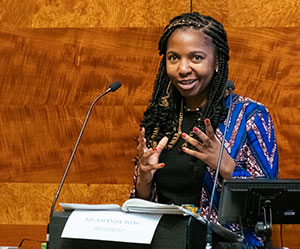 Following Niall’s presidential address, Amanda returned to the stage to welcome her guest speaker – Dr Patricia Mundy MRCVS, an ophthalmologist at the Matthew J Ryan Veterinary Hospital at the University of Pennsylvania, the lead veterinary ophthalmologist for the New York Police Department and a former colleague of Amanda’s.
Following Niall’s presidential address, Amanda returned to the stage to welcome her guest speaker – Dr Patricia Mundy MRCVS, an ophthalmologist at the Matthew J Ryan Veterinary Hospital at the University of Pennsylvania, the lead veterinary ophthalmologist for the New York Police Department and a former colleague of Amanda’s.
During Dr Mundy’s talk ‘Navigating Diversity and Inclusion in the Veterinary Profession’, she detailed her journey from a North London council estate to studying veterinary medicine at the University of Cambridge and then completing a Fellowship in Comparative Ophthalmic Pathology at the University of Wisconsin Veterinary School, followed by a residency at Cornell University in Ithaca, New York. She also spoke about her experiences as a black veterinary surgeon in a profession that is – both in the UK and the US – overwhelmingly white.
She talked about how, during the first 10 years of her career, including her time at vet school, she did not meet any other vets who looked like her and said that there is a strong case for increasing ethnic minority participation in veterinary medicine based on the fact that society is becoming more diverse and that the profession, therefore, needs to reflect society better.
In terms of tackling lack of diversity, she said that a key first step was to admit that there was a problem, and praised the College’s and Amanda’s recognition of this. She then identified a number of other barriers to joining the veterinary profession that could disproportionately affect those from BAME backgrounds, including a lack of role models, lack of knowledge about the cultural significance of animals, the role of class and socio-economic background and educational disadvantages.
In conclusion, she said: “As a global society, we have evolved to reach a consensus that now is the time for working to achieve inclusive environments across all professions. The path to professional inclusiveness and competence is clear; a systematic approach to achieving meaningful diversity and inclusion in the veterinary profession is essential. Our profession, like all others, requires diverse practitioners so as to reflect our nation’s population and the world we serve.”
A fuller report of the day as well as the full speeches from Amanda Boag, Niall Connell, Racheal Marshall and Lizzie Lockett will be made available on the Features section in due course.